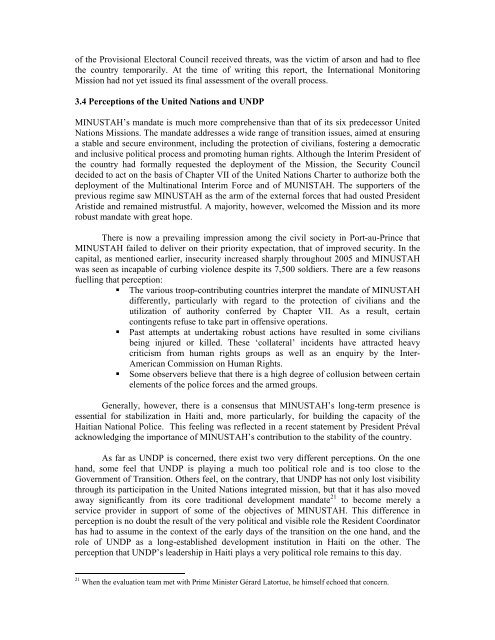case study Haiti - United Nations Development Programme
case study Haiti - United Nations Development Programme
case study Haiti - United Nations Development Programme
Create successful ePaper yourself
Turn your PDF publications into a flip-book with our unique Google optimized e-Paper software.
of the Provisional Electoral Council received threats, was the victim of arson and had to flee<br />
the country temporarily. At the time of writing this report, the International Monitoring<br />
Mission had not yet issued its final assessment of the overall process.<br />
3.4 Perceptions of the <strong>United</strong> <strong>Nations</strong> and UNDP<br />
MINUSTAH’s mandate is much more comprehensive than that of its six predecessor <strong>United</strong><br />
<strong>Nations</strong> Missions. The mandate addresses a wide range of transition issues, aimed at ensuring<br />
a stable and secure environment, including the protection of civilians, fostering a democratic<br />
and inclusive political process and promoting human rights. Although the Interim President of<br />
the country had formally requested the deployment of the Mission, the Security Council<br />
decided to act on the basis of Chapter VII of the <strong>United</strong> <strong>Nations</strong> Charter to authorize both the<br />
deployment of the Multinational Interim Force and of MUNISTAH. The supporters of the<br />
previous regime saw MINUSTAH as the arm of the external forces that had ousted President<br />
Aristide and remained mistrustful. A majority, however, welcomed the Mission and its more<br />
robust mandate with great hope.<br />
There is now a prevailing impression among the civil society in Port-au-Prince that<br />
MINUSTAH failed to deliver on their priority expectation, that of improved security. In the<br />
capital, as mentioned earlier, insecurity increased sharply throughout 2005 and MINUSTAH<br />
was seen as incapable of curbing violence despite its 7,500 soldiers. There are a few reasons<br />
fuelling that perception:<br />
• The various troop-contributing countries interpret the mandate of MINUSTAH<br />
differently, particularly with regard to the protection of civilians and the<br />
utilization of authority conferred by Chapter VII. As a result, certain<br />
contingents refuse to take part in offensive operations.<br />
• Past attempts at undertaking robust actions have resulted in some civilians<br />
being injured or killed. These ‘collateral’ incidents have attracted heavy<br />
criticism from human rights groups as well as an enquiry by the Inter-<br />
American Commission on Human Rights.<br />
• Some observers believe that there is a high degree of collusion between certain<br />
elements of the police forces and the armed groups.<br />
Generally, however, there is a consensus that MINUSTAH’s long-term presence is<br />
essential for stabilization in <strong>Haiti</strong> and, more particularly, for building the capacity of the<br />
<strong>Haiti</strong>an National Police. This feeling was reflected in a recent statement by President Préval<br />
acknowledging the importance of MINUSTAH’s contribution to the stability of the country.<br />
As far as UNDP is concerned, there exist two very different perceptions. On the one<br />
hand, some feel that UNDP is playing a much too political role and is too close to the<br />
Government of Transition. Others feel, on the contrary, that UNDP has not only lost visibility<br />
through its participation in the <strong>United</strong> <strong>Nations</strong> integrated mission, but that it has also moved<br />
away significantly from its core traditional development mandate 21 to become merely a<br />
service provider in support of some of the objectives of MINUSTAH. This difference in<br />
perception is no doubt the result of the very political and visible role the Resident Coordinator<br />
has had to assume in the context of the early days of the transition on the one hand, and the<br />
role of UNDP as a long-established development institution in <strong>Haiti</strong> on the other. The<br />
perception that UNDP’s leadership in <strong>Haiti</strong> plays a very political role remains to this day.<br />
21 When the evaluation team met with Prime Minister Gérard Latortue, he himself echoed that concern.

















